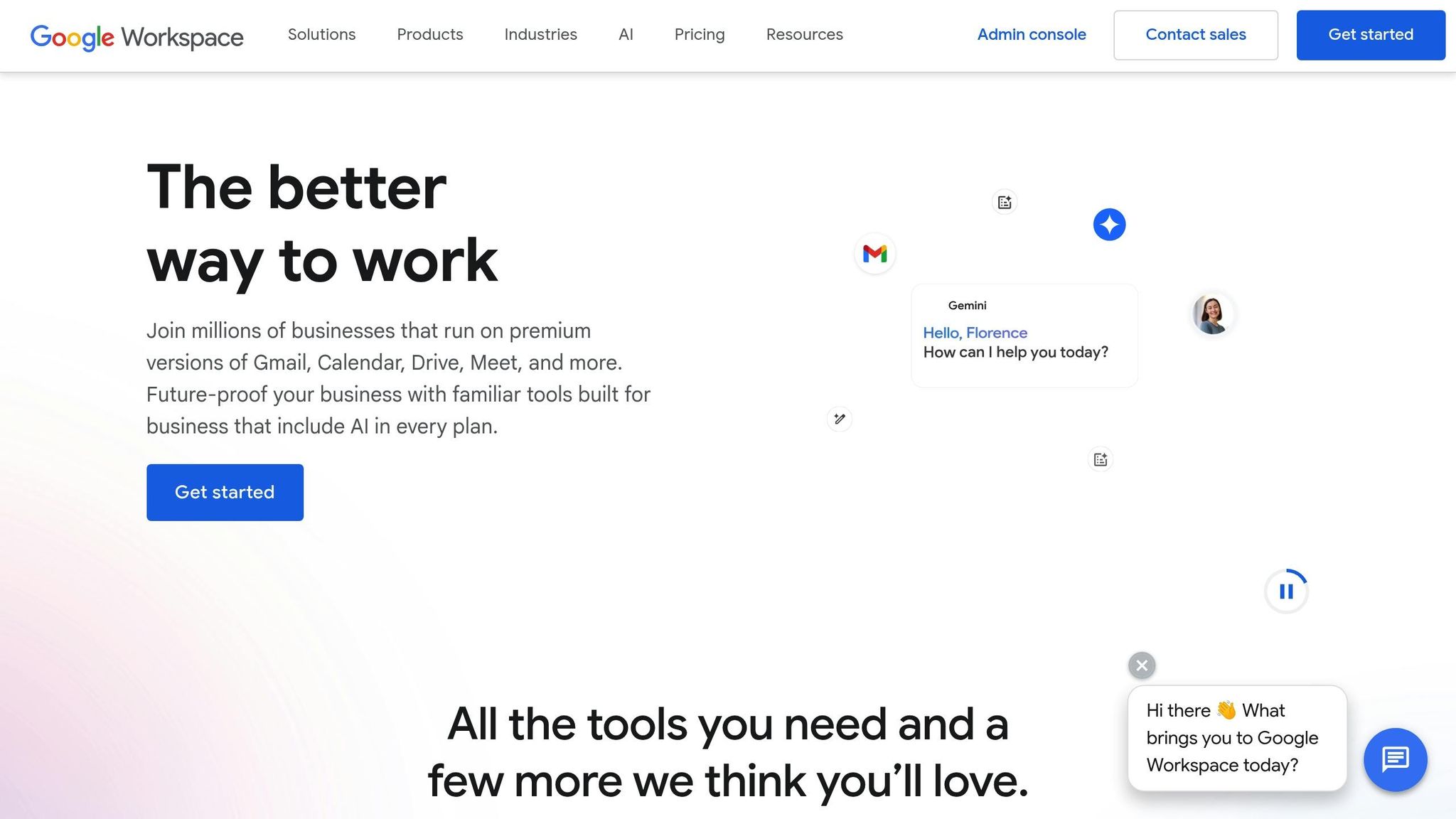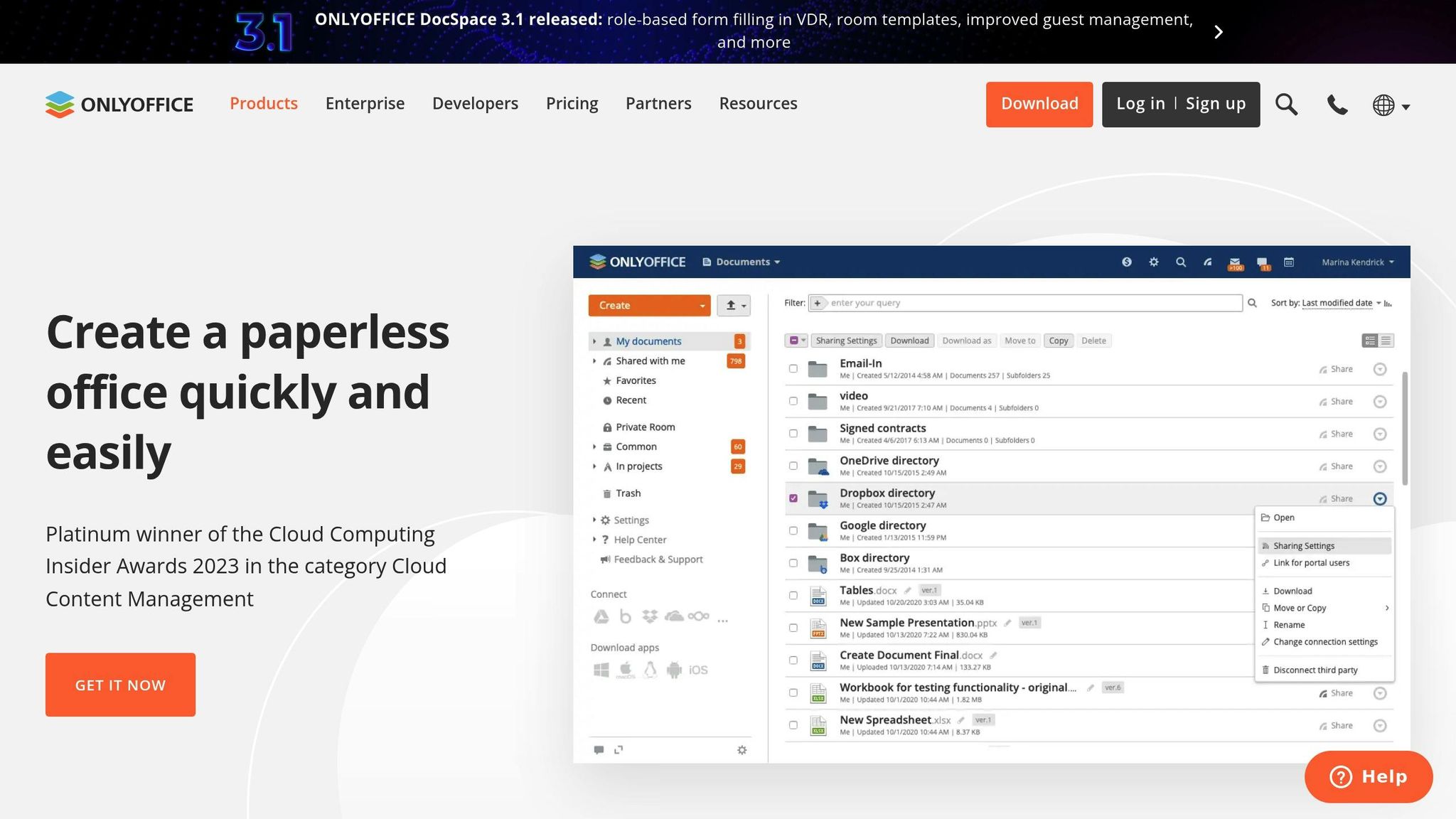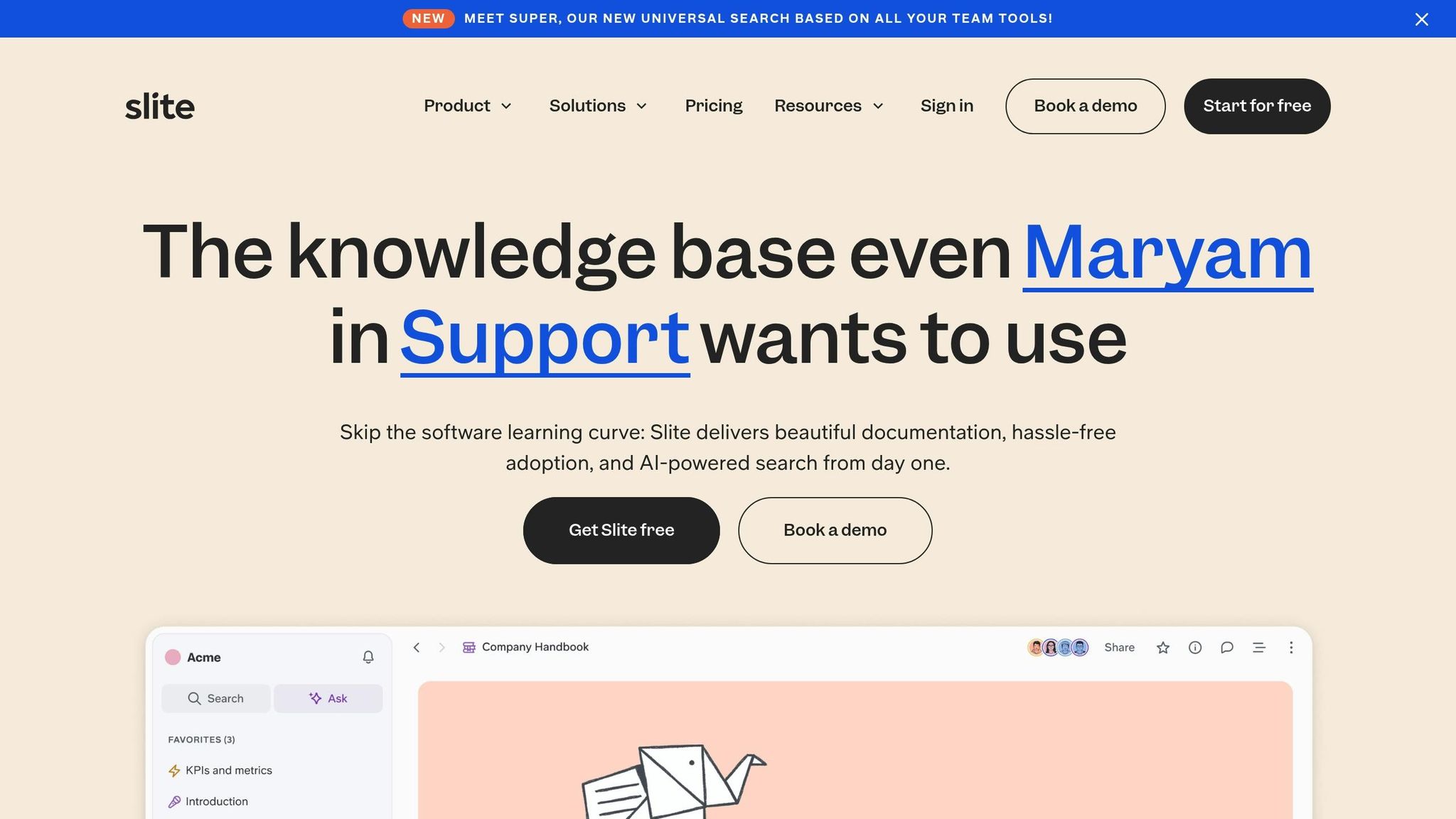In 2025, remote work continues to grow, and businesses need reliable tools for document editing and collaboration. Here's a quick guide to the best tools available:
- Google Workspace: Perfect for real-time collaboration with AI-powered features and seamless integration across Google tools.
- Microsoft OneDrive for Business: Ideal for industries needing strong security, like healthcare and finance, with advanced encryption and compliance features.
- ONLYOFFICE: Offers customizable deployment options and supports plugin development for tailored solutions.
- Slite: Best for knowledge management, providing templates, workflows, and advanced search for organizing information.
Quick Comparison
| Tool | Key Features | Best For |
|---|---|---|
| Google Workspace | AI tools, real-time editing, file compatibility | Cross-functional collaboration |
| OneDrive | Encryption, compliance, threat protection | Secure industries (e.g., finance) |
| ONLYOFFICE | Self-hosting, plugin support, version tracking | Customizable infrastructure |
| Slite | Templates, workflows, knowledge organization | Knowledge management teams |
When choosing, focus on integration, security, and scalability to match your team's needs.
7 Best Document Management Software Tools 2025 (Full ...
Leading Document Editing Tools for Business in 2025
This section highlights some of the top collaborative document editing tools businesses are using in 2025.
Google Workspace

Google Workspace stands out for its real-time collaboration and advanced editing features. With AI-driven writing tools and seamless integration across Google services, it's a popular choice for consulting firms juggling multiple client projects.
Key features:
- AI-powered tools like Smart Compose and grammar suggestions
- Real-time collaboration with no participant limits
- Detailed access controls and audit logs
- Compatibility with various file types for easy editing
Its ability to handle complex documentation makes it perfect for cross-functional teams. For example, IT consulting firms can manage detailed project records while allowing multiple stakeholders to work together in real time.
Microsoft OneDrive for Business
OneDrive for Business is tailored for industries that need top-tier security and compliance, such as healthcare, finance, and energy. Its robust features ensure sensitive data is well-protected.
Features include:
- End-to-end encryption for secure document handling
- Threat protection to guard against cyber risks
- Automated detection and classification of sensitive content
- Full integration with the Microsoft 365 suite
| Security Feature | Benefit | Industry Application |
|---|---|---|
| Information Rights Management | Encrypts documents at the file level | Financial services |
| Data Loss Prevention | Identifies and protects sensitive data | Healthcare |
| Advanced eDiscovery | Tracks document activity for audits | Legal consulting |
| Conditional Access | Adds location-based security | Energy sector |
These features make OneDrive for Business a trusted option for industries handling confidential information.
ONLYOFFICE

ONLYOFFICE is a great fit for businesses looking for customizable document management. It provides flexible deployment options and supports remote collaboration.
Notable capabilities:
- Options for self-hosted deployments
- Support for custom plugin development
- Document versioning to track changes
- Compatibility with multiple file formats
This level of flexibility is ideal for organizations wanting full control over their document infrastructure.
Slite

Slite is designed for teams focused on knowledge management. Consulting firms, in particular, benefit from its ability to organize and maintain extensive knowledge bases and client records.
Key features:
- Easy-to-use templates for document creation
- Automated tools to organize knowledge efficiently
- Built-in workflows for document approvals
- Advanced search functionality
Slite is especially effective for teams that need quick access to large amounts of structured information, making it a go-to tool for strategy and management consulting teams.
Each of these tools offers distinct strengths. Your choice should align with your specific needs for security, collaboration, and system integration.
How to Select a Document Editing Tool
Choosing the right document editing tool means focusing on integration, collaboration, security, and the ability to grow with your needs.
Software Integration Requirements
Look for tools that fit well with your existing software. Key integration areas include:
| Integration Type | Business Impact | Key Considerations |
|---|---|---|
| Project Management | Streamlined workflows | Ensure compatibility with platforms like Jira, Asana, or Monday.com. |
| CRM Systems | Easy client document access | Verify smooth integration with tools like Salesforce or HubSpot. |
| Cloud Storage | Reliable file syncing | Check for connectivity with services like Box or Dropbox Enterprise. |
| Communication Tools | Real-time teamwork | Confirm integration with tools like Teams, Slack, or Zoom. |
These integrations enhance both team collaboration and security measures.
Team Access and Collaboration
Collaboration features are essential. Pay attention to:
- Real-time editing for multiple users
- Version control to track changes
- Detailed permission settings for user access
- Support across different devices and platforms
Data Security Standards
Security is a top priority for enterprise tools. Evaluate these key areas:
1. Compliance Certifications
Make sure the tool follows industry standards. Look for certifications like SOC 2 Type II, ISO 27001, and compliance with GDPR.
2. Authentication Methods
Check for robust authentication options, such as:
- Single Sign-On (SSO)
- Multi-factor authentication (MFA)
- Integration with directory services like Active Directory or LDAP
3. Data Protection
Ensure data is secure both in transit and at rest through:
- End-to-end encryption
- Options for custom key management
- Regular security audits to identify vulnerabilities
Growth and Performance
Choose a tool that can handle your current needs and grow with your business. Evaluate the following:
| Performance Factor | Evaluation Criteria | Growth Indicator |
|---|---|---|
| User Capacity | Number of users supported simultaneously | Can handle more users as your team grows |
| Storage Limits | Ability to manage increasing document volume | Scales with your data storage needs |
| API Performance | Handles multiple app integrations efficiently | Supports higher usage without losing performance |
| Search Efficiency | Quick document retrieval | Maintains speed even with large data sets |
Plan for both present and future needs. A pilot program can help you test the tool's suitability before rolling it out fully. By following these guidelines, you can select a document editing tool that works seamlessly with your workflows and supports your business goals.
sbb-itb-97f6a47
Document Editing in Digital Business
Modern document editors play a key role in digital business operations, especially for remote teams working within digital enterprises.
Cross-Department Workflow
These platforms make interdepartmental collaboration more efficient by providing centralized workspaces.
| Workflow Element | Business Impact |
|---|---|
| Version Control | Keeps a single, consistent source of truth across departments |
| Access Management | Restricts permissions to the appropriate teams |
| Review Cycles | Simplifies cross-team approval processes |
| Change Tracking | Adds accountability by tracking edits and updates |
To streamline document management, use consistent templates, folder structures, naming practices, and approval workflows. Once these workflows are standardized, automation can take productivity to the next level.
How Automation Improves Efficiency
Document editing tools use automation to save time and reduce manual effort:
-
Smart Processing and Workflows
Automation features include grammar and style checks, content suggestions based on company policies, automatic routing and notifications, scheduled archiving, and translation options for global teams. -
Template Management
Automation also enables data auto-population from integrated systems, linked content updates across multiple files, automated report creation, and consistent branding across all documents.
These features not only boost productivity but also help ensure security and compliance are upheld.
Conclusion
The best document editing tool is one that fits seamlessly into your current workflows while also supporting future growth. Selecting the right option means addressing both your immediate needs and long-term goals in today’s fast-changing digital world.
As mentioned earlier, it's crucial to prioritize integration, scalability, and security. These tools can handle tasks like file sharing, version control, and notifications, making processes more efficient across teams and departments.
For growing remote teams, the platform should scale to handle:
- Larger user bases and simultaneous editing
- Expanded storage needs
- More detailed permission settings
- Stronger security measures
- Compliance with stricter regulations
The most effective tools strike a balance between powerful features and an easy-to-use interface, ensuring smooth collaboration for everyone, regardless of technical expertise. Success lies in choosing a tool that aligns with your organization’s specific workflows and security demands. Take the time to carefully evaluate options that meet both your current requirements and future goals.
FAQs
What should businesses consider when choosing between Google Workspace and Microsoft OneDrive for remote document editing?
When selecting between Google Workspace and Microsoft OneDrive for Business for remote document editing, businesses should evaluate a few key factors:
- Collaboration Features: Google Workspace excels in real-time collaboration, making it ideal for teams that need simultaneous editing. OneDrive integrates seamlessly with Microsoft Office apps, which are widely used in many organizations.
- Integration with Existing Tools: Consider which platform aligns better with your current software stack. For instance, if your team already uses Microsoft Office, OneDrive may provide smoother integration.
- Storage and Pricing: Compare the storage capacity and pricing plans of both platforms to ensure they meet your team’s needs and budget.
Ultimately, the decision depends on your team’s workflow, existing tools, and collaboration requirements. Both platforms are robust solutions that cater to remote teams effectively.
What steps can companies take to ensure their document editing tools meet industry security standards and regulations?
To ensure document editing tools comply with industry security standards and regulations, companies should prioritize tools that offer robust security features such as data encryption, access controls, and audit trails. Look for certifications like ISO/IEC 27001 or compliance with frameworks like GDPR, HIPAA, or SOC 2, depending on your industry requirements.
Additionally, regularly review and update your security policies, provide employee training on data protection, and collaborate with IT or consulting experts to perform audits and risk assessments. These measures help ensure that your tools and practices align with both legal requirements and best practices for safeguarding sensitive information.
What advantages does ONLYOFFICE offer for businesses needing highly customizable document management solutions?
ONLYOFFICE is an excellent choice for businesses that require a high degree of customization in their document management systems. It allows organizations to tailor workflows, permissions, and integrations to align with their unique needs, ensuring seamless collaboration across remote teams.
Some key benefits include:
- Flexible integration options: ONLYOFFICE supports integration with popular tools like CRM systems, project management platforms, and cloud storage services.
- Advanced customization features: Businesses can adapt the platform to match their branding, processes, and specific operational requirements.
- Enhanced collaboration tools: It offers real-time co-editing, version control, and secure sharing, making it ideal for distributed teams.
With its robust functionality and adaptability, ONLYOFFICE empowers businesses to optimize productivity while maintaining control over their document management processes.


